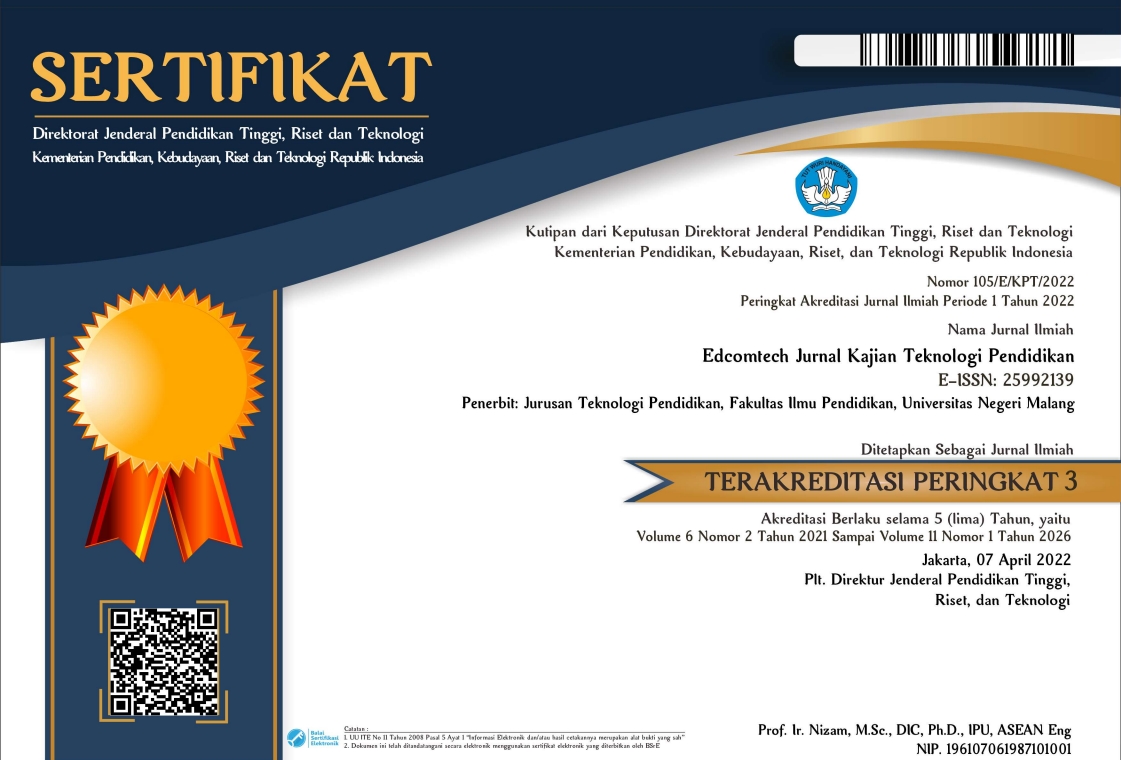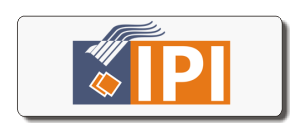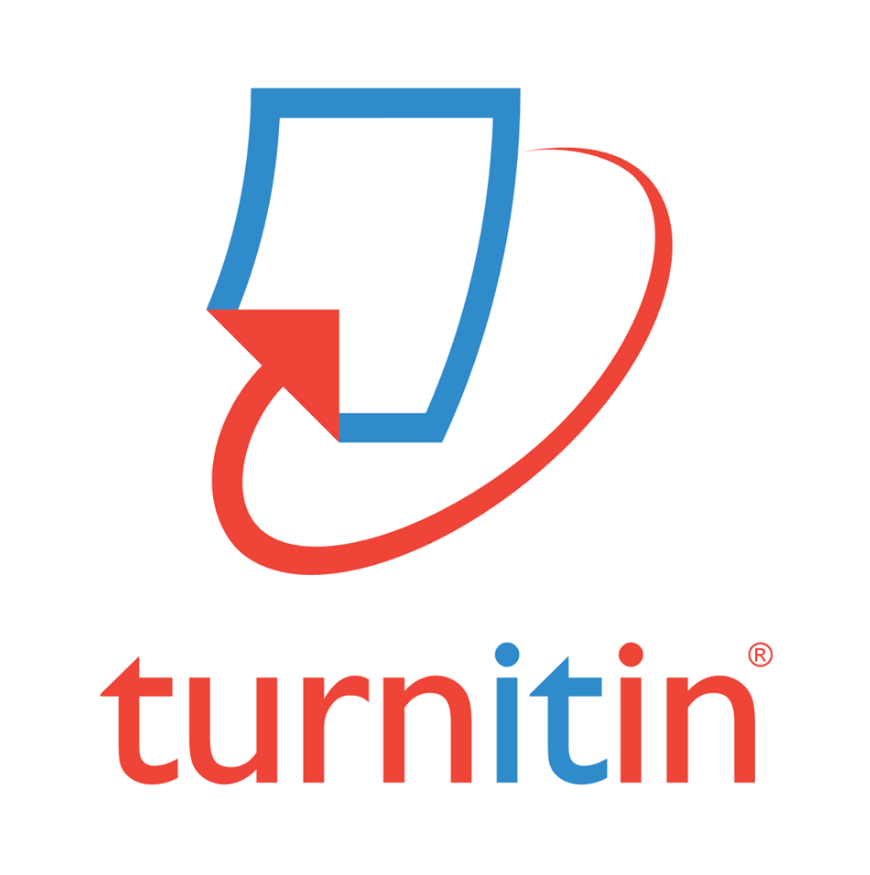Electronic Module With Project Based Learning (PjBL): Innovation Of Digital Learning Product On 4.0 Era
Abstract
Keywords
Full Text:
PDFReferences
Alvermann, D. E., & Sanders, R. K. (2019). Adolescent literacy in a digital world. The International Encyclopedia Of Media Literacy, 1-6. DOI: 10.1002/9781118978238.ieml0005.
Armanta, A. Y., Mustaji, M., & Suryaman, S. (2019). The Influence of the Problem Based Learning and Attitudess Towards Learning Outcomes for Mathematics. Edcomtech Jurnal Kajian Teknologi Pendidikan, 4(1), 1-7. DOI: 10.17977/um039v4i12019p001.
Coşkun, S., Kayıkcı, Y., & Gençay, E. 2019. Adapting Engineering Education to Industry 4.0 Journal of Vision. Technologies, 7(1), 10. DOI: 10.3390/technologies7010010.
Cresswell, J. C. 2012. Education Research, Planning, Conducting Evaluating Quantitative and Qualitative Research 4th Edition. Boston: Pearson Ltd.
Dick, W.C, Carey, J. O. 2015. The Systematic Design of Instruction. New Jersey: Pearson Ltd.
García, C. 2016. Project-Based Learning in Virtual Groups-Collaboration And Learning Outcomes In A Virtual Training Course For Teachers. Procedia-Social and Behavioral Sciences, 228, 100-105. DOI: 10.1016/j.sbspro.2016.07.015.
Genc, M. (2015). The project-based learning approach in environmental education. International Research in Geographical and Environmental Education, 24(2), 105-117.DOI: 10.1080/10382046.2014.993169.
Guo, Q. 2015. Learning in a Mixed Reality System in the Context of ‚Industrie 4.0 ‘. Journal of Technical Education (JOTED), 3(2).
Handerson, M., Selwyn, N. & Aston, R. (2017). What Works dan Why? Student Perception of ‘Useful’ Digital Technology in University Teaching and Learning. Journal of Studies in Higher Education, 42(8), 1567-1579. DOI: 10.1080/03075079.2015.1007946.
Hold, P., Erol, S., Reisinger, G., & Shin, W. 2017. Planning dan Evaluation of Digital Assistance Systems. Procedia Manufacturing, 9, 143-150. DOI: 10.1016/j.promfg.2017.04.024.
Indahwati, N., Tuasikal, A. R. S., & Al Ardha, M. A. 2019. Developing Project Based Learning (PBL) as a teaching Strategy in Physical Education for Preservice Physical Education Teacher. In 1st International Conference on Education Social Sciences and Humanities (Atlantis Press), DOI: 10.2991/icesshum-19.2019.79.
Iwamoto, D. H., Hargis, J., & Vuong, K. 2016. The Effect Of Project-Based Learning On Student Performance: An Action Research Study. International Journal for the Scholarship of Technology Enhanced Learning, 1(1), 24-42.
Klassen, R. M., & Chiu, M. M. (2011). The occupational commitment and intention to quit of practicing and pre-service teachers: Influence of self-efficacy, job stress, and teaching context. Contemporary Educational Psychology, 36(2), 114-129. DOI: 10.1016/j.cedpsych.2011.01.002.
Lee, D., Huh, Y., & Reigeluth, C. M. (2015). Collaboration, intragroup conflict, and social skills in project-based learning. Instructional Science, 43(5), 561-590.
Lemoine, P. A., Yates, M., & Richardson, M. D. (2019). Technology and learning: preparing teachers for the future. In Pre-Service and In-Service Teacher Education: Concepts, Methodologies, Tools, and Applications (IGI Global), 2164-2182. DOI: 10.4018/978-1-5225-7305-0.ch101.
Lin, M. H., Chen, H. C., & Liu, K. S. 2017. A Study of The Effects of Digital Learning on Learning Motivation And Learning Outcome. Eurasia Journal of Mathematics, Science and Technology Education, 13(7), 3553-3564. DOI: 10.12973/eurasia.2017.00744a.
Malik, A., Suryaman, S., & Rusmawati, R. D. (2019). Pengaruh Pengelolaan Diri Siswa Dan Karakter Guru terhadap Prestasi Belajar Siswa Kelas X SMK Satya Widya Surabaya dan SMK Tri Tunggal Surabaya. Edcomtech Jurnal Kajian Teknologi Pendidikan, 4(2), 143-152. DOI: 10.17977/um039v4i22019p143.
McLoughlin, C., & Lee, M. J. 2010. Developing an Online Community to Promote Engagement and Professional Learning For Pre-Service Teachers Using Social Software Tools. Journal of Cases on Information Technology (JCIT), 12(1), 17-30, DOI 10.4018/jcit.2010010102.
Mitchell, T., Cohen, W., Hruschka, E., et.all. 2018. Never-Ending Learning. Journal of Communications of The ACM, 61(5), 103-115. DOI: 10.1145/3191513.
Saljo, R. 2010. Digital Tools and Challenges to Institutonal Traditions of Learning:Technologies, Social Memory, and The Performative Nature of Learning. Journal of Computer Assisted Learning, 26, 1. DOI: 10.1111/j.1365-2729.2009.00341.x.
Stachová, K., Papula, J., Stacho, Z., & Kohnová, L. 2019. External partnerships in employee education and development as the key to facing industry 4.0 challenges. Sustainability, 11(2), 345. DOI: 10.3390/su11020345.
Sweeney, P., & Moore, C. 2012. Mobile apps for learning vocabulary: Categories, evaluation and design criteria for teachers and developers. International Journal of Computer-Assisted Language Learning and Teaching (IJCALLT), 2(4), 1-16. DOI: 10.4018/ijcallt.2012100101.
Tanjung, R. F. 2019. Answering the Challenge of Industrial Revolution 4.0 Through Improved Skills Use of Technology College. International Journal for Educational and Vocational Studies, 1(1), 11-14. DOI: 10.29103/ijevs.v1i1.1374.
Voogt, J., Erstad, O., Dede, C., & Mishra, P. 2013. Challenges to learning and schooling in the digital networked world of the 21st century. Journal of Computer Assisted Learning, 29(5), 403-413, doi: 10.1111/jcal.12029.
Woo, J. C. 2014. Digital Game-Based Learning Supports Student Motivation, Cognitive Success, And Performance Outcomes. Journal of Educational Technology & Society, 17(3), 291-307.
Yadin, A., & Or-Bach, R. 2019. The Importance Of Emphasizing Individual Learning In The “Collaborative Learning Era”. Journal of Information Systems Education, 21(2), 5, form https://aisel.aisnet.org/jise/vol21/iss2/5.
Zhang, Z., Hansen, C. T., & Andersen, M. A. 2015. Teaching power electronics with a design-oriented, project-based learning method at the Technical University of Denmark. IEEE Transactions on Education, 59(1), 32-38. DOI: 10.1109/TE.2015.2425574.
DOI: http://dx.doi.org/10.17977/um039v5i22020p155
Refbacks
- There are currently no refbacks.
Copyright (c) 2020 Titis Angga Rini

This work is licensed under a Creative Commons Attribution-ShareAlike 4.0 International License.
Edcomtech: Jurnal Kajian Teknologi Pendidikan published by Department of Educational Technology, Faculty of Education, State University of Malang in Collaboration with Asosiasi Program Studi Teknologi Pendidikan Indonesia (APS TPI) and Ikatan Profesi Teknologi Pendidikan Indonesia (IPTPI) with MoU.
Publisher Address:
Lab. Teknologi Pendidikan, Gd.E2, Lt.1
Fakultas Ilmu Pendidikan Universitas Negeri Malang
Jalan Semarang No 5, Kota Malang Kode Pos 65145
Email: edcomtech.fip@um.ac.id
========================================================================================================
| INDEXED BY | TOOLS | PLAGIARISM CHECK | ARTICLE TEMPLATE |
|

Edcomtech is licensed under a Creative Commons Attribution-ShareAlike 4.0 International License.
Edcomtech Statistics (Since July 13th, 2020)











1.png)








